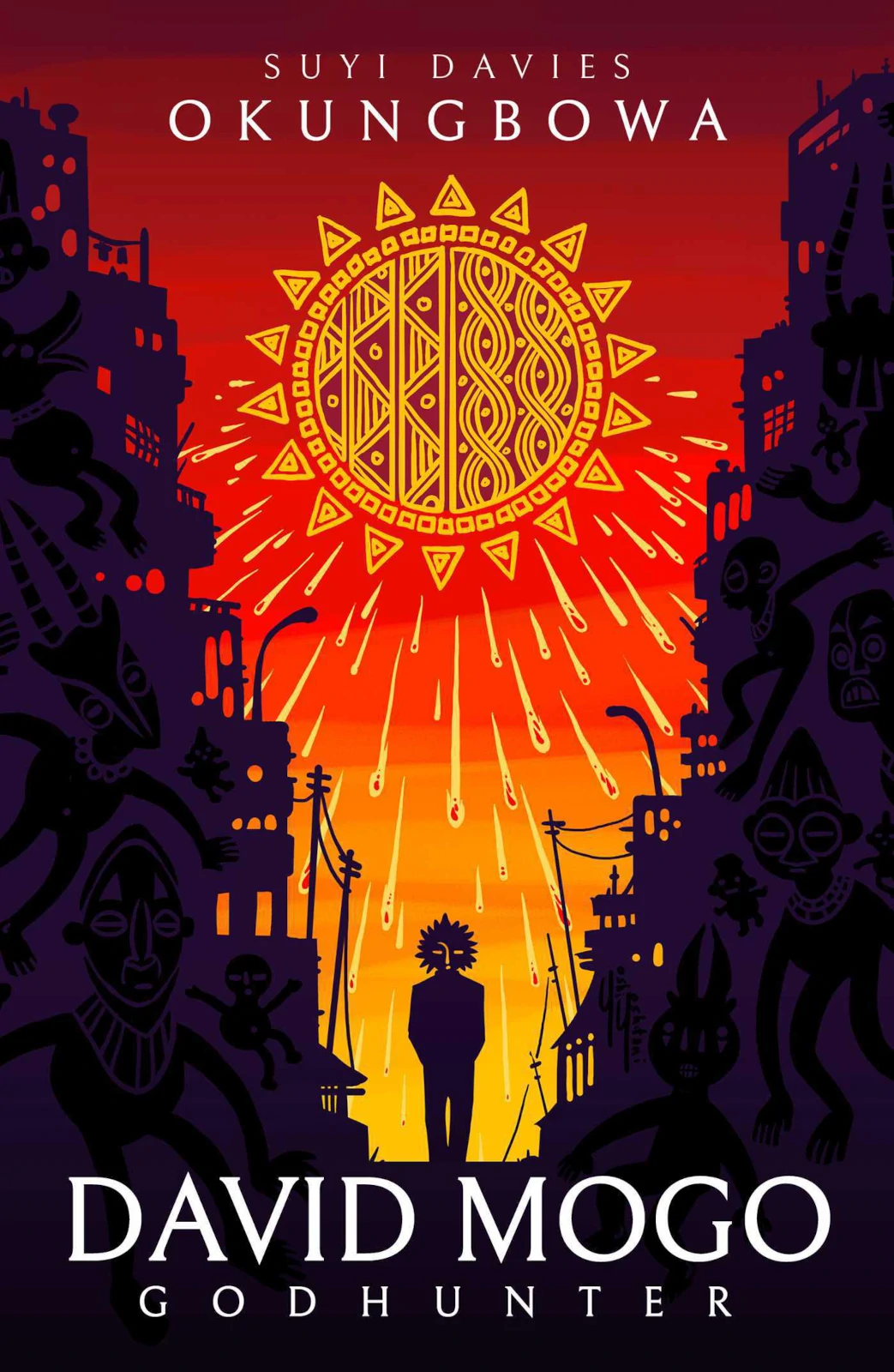
Three Books for the Price of One: A Review of David Mogo, Godhunter by Suyi Davies Okungbowa
Words By Giancarlo Riccobon
Published July 9, 2019 by Abaddon Books.
Had this novel been set in, say, London, it would likely have been a run-of-the-mill urban fantasy. But David Mogo, Godhunter is set in Nigeria, which makes things a lot more interesting.
After the gods fall to Earth, the city of Lagos descends into chaos. Those who have enough money leave Lagos, while those who don’t struggle to survive. Demigod David Mogo makes a living as a godhunter, but he bites off more than he can chew when he agrees to capture two high gods for the wizard gangster Ajala. Now, in order to save his home, David must embrace the godly aspect of his identity that he has been trying to repress.
Admittedly, this debut novel falls into some urban fantasy tropes—a plot to summon dark gods and a demigod Chosen One who needs to stop it. The beginning is loaded with worldbuilding infodumps. But Suyi Davies Okungbowa makes this story his own thanks to the cultural context of Nigeria. The novel makes constant nods to gentrification in present-day Nigeria, which is mirrored in the way people respond to the fallen gods—the rich evacuate, and the poor are out of luck. The situation of the Falling (a war that destroys the realm of the gods and leaves thousands of homeless gods stranded in Nigeria) can even be read as a metaphor for refugee experiences.
Beneath the tropes, Okungbowa grounds his novel with a touch of realism. In one scene, David is navigating Lagos traffic and parks his motorcycle to let its engine cool down. Later, in a camp of refugees fleeing the fallen gods, David joins a crowd of people clustered around the single TV they could salvage, watching a recorded El Classico match between Barcelona and Real Madrid. It’s little details like these that make this debut fresh and authentic.
David also has his share of vulnerabilities. He has serious trust issues, always underestimating his friends and growing suspicious of his allies. At least twice he walks right into a trap. Under his bluster, David is still human, and his most humanizing quality is that he must always worry about protecting his loved ones. This comes to a head in the climax, when the villain decides that the best way to hurt David is by hurting his friends.
The characters that David considers his family are diverse but not always fleshed out. The main antagonist, Aganju, is fascinating because he truly believes that he and David want the same thing, and it’s a great loss that readers don’t see this side of Aganju until the last thirty pages. On the other hand, David’s adoptive grandfather Papa Udi is cool from start to finish, especially since his dialogue is mostly in Nigerian Pidgin.
Another intriguing character is Fati, a Muslim girl with a speech impediment. Alas, she doesn’t get much space on the page. When she’s not possessed by a god, David is telling her that it’s too dangerous for a teenager to come along on his missions. Fati later proves that she’s far from helpless, but, like with Aganju, it feels like too little, too late.
Although this treatment of Fati is disappointing, David Mogo, Godhunter still has some strong female characters who charge into battle with David. For starters, David’s mother is a goddess of war. There’s also Femi, head of the Lagos State Paranormal Commission, and Shoguna, a wizard protecting a camp of refugees. These two women later become an inseparable couple.
As David’s makeshift family grows, it becomes harder for Okungbowa to develop each character individually. By Part Three, when David’s band of heroes grows to nine people, it becomes too big to give sufficient page space to each of them. As a result, readers may lose a bit of emotional investment in the characters.
Those looking for a traditional three-act plot structure won’t find it here. Each of the novel’s three parts (Godhunter, Flamebringer, and Warmonger), is its own self-contained story arc. At times, the story swings between full-blown climax mode and simmering second-act mode without much warning. For example, at the end of Part One, David foils the villain’s plot and assumes the case is closed, but by the next chapter, readers learn that that the villain is bringing his Plan B into motion.
However, the unorthodox shape the story takes is not such a bad thing. Yes, it’s disorienting at first to see a book with three separate climaxes. But once you accept that, you can start to appreciate the author’s structural choice. In a way, Okungbowa is giving his readers an entire trilogy in less than 350 pages. Rather than drawing out the story unnecessarily, he pares down each “book” in his trilogy to its bare bones. The result is a fast-paced rollercoaster ride that advances the story with almost every chapter. It’s satisfying to see David Mogo grow so much over the course of a few hundred pages—from self-serving godhunter to reluctant war god. Some trilogies will take us through two whole books before their hero finally changes, but Okungbowa wisely keeps his protagonist in constant motion.